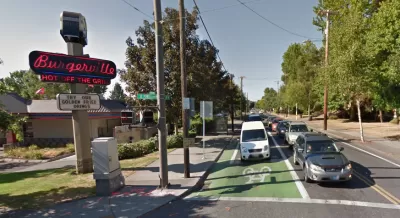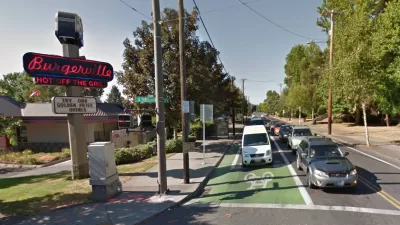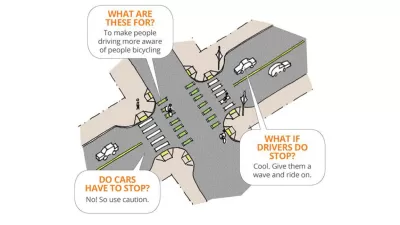A bike advocate tells the story of the how the state department of transportation convinced local officials to remove a popular bike lane in Portland.

"Two of southeast Portland’s most-ridden bike lanes are slated to be removed at the insistence of the state of Oregon," reports Michael Andersen.
According to Andersen, the "[bike lanes on each side of Southeast 26th Avenue near Powell draw something like 600 to 800 people per day (even in winter) and run in front of Cleveland High School. They will be paved over sometime in the coming months and not replaced." The decision comes from the Oregon Department of Transportation (ODOT), which announced the project last week.
The city of Portland, however, had to accept the decision of the state to remove the lane, despite disagreement over the potential safety impacts. The ODOT believes that removing the bike lane will improve safety at the intersection of SE Powell at SE 26th by reducing the number of bicycles on the street. Many bike riders, according to an ODOT spokesperson, will switch to 28th Avenue instead "when a new traffic signal and neighborhood greenway are installed there in the coming months."
Andersen clearly opposes the removals, providing several examples of evidence and policy maxims that contradict the claims made by the ODOT. By providing a lot more information on this specific example and the other projects and events that led to the decision to pave over the lanes, Andersen also provides an unfortunate case study of a city and a state failing to resolve differences in their approaches to streets.
FULL STORY: City gives in to state demand to remove bike lanes from SE 26th Avenue

Planetizen Federal Action Tracker
A weekly monitor of how Trump’s orders and actions are impacting planners and planning in America.

Chicago’s Ghost Rails
Just beneath the surface of the modern city lie the remnants of its expansive early 20th-century streetcar system.

San Antonio and Austin are Fusing Into one Massive Megaregion
The region spanning the two central Texas cities is growing fast, posing challenges for local infrastructure and water supplies.

Since Zion's Shuttles Went Electric “The Smog is Gone”
Visitors to Zion National Park can enjoy the canyon via the nation’s first fully electric park shuttle system.

Trump Distributing DOT Safety Funds at 1/10 Rate of Biden
Funds for Safe Streets and other transportation safety and equity programs are being held up by administrative reviews and conflicts with the Trump administration’s priorities.

German Cities Subsidize Taxis for Women Amid Wave of Violence
Free or low-cost taxi rides can help women navigate cities more safely, but critics say the programs don't address the root causes of violence against women.
Urban Design for Planners 1: Software Tools
This six-course series explores essential urban design concepts using open source software and equips planners with the tools they need to participate fully in the urban design process.
Planning for Universal Design
Learn the tools for implementing Universal Design in planning regulations.
planning NEXT
Appalachian Highlands Housing Partners
Mpact (founded as Rail~Volution)
City of Camden Redevelopment Agency
City of Astoria
City of Portland
City of Laramie





























